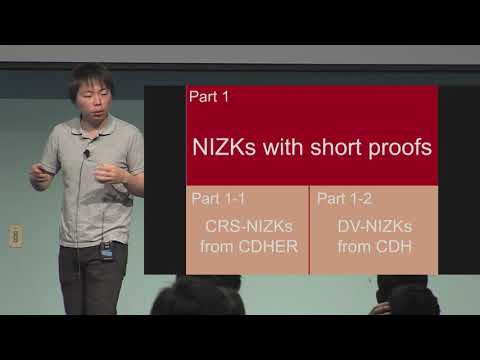CryptoDB
Exploring Constructions of Compact NIZKs from Various Assumptions
| Authors: | |
|---|---|
| Download: |
|
| Abstract: | A non-interactive zero-knowledge (NIZK) protocol allows a prover to non-interactively convince a verifier of the truth of the statement without leaking any other information. In this study, we explore shorter NIZK proofs for all $$\mathbf{NP }$$ languages. Our primary interest is NIZK proofs from falsifiable pairing/pairing-free group-based assumptions. Thus far, NIZKs in the common reference string model (CRS-NIZKs) for $$\mathbf{NP }$$ based on falsifiable pairing-based assumptions all require a proof size at least as large as $$O(|C| \kappa )$$, where C is a circuit computing the $$\mathbf{NP }$$ relation and $$\kappa $$ is the security parameter. This holds true even for the weaker designated-verifier NIZKs (DV-NIZKs). Notably, constructing a (CRS, DV)-NIZK with proof size achieving an additive-overhead $$O(|C|) + \mathsf {poly}(\kappa )$$, rather than a multiplicative-overhead $$|C| \cdot \mathsf {poly}(\kappa )$$, based on any falsifiable pairing-based assumptions is an open problem.In this work, we present various techniques for constructing NIZKs with compact proofs, i.e., proofs smaller than $$O(|C|) + \mathsf {poly}(\kappa )$$, and make progress regarding the above situation. Our result is summarized below. We construct CRS-NIZK for all $$\mathbf{NP }$$ with proof size $$|C| +\mathsf {poly}(\kappa )$$ from a (non-static) falsifiable Diffie-Hellman (DH) type assumption over pairing groups. This is the first CRS-NIZK to achieve a compact proof without relying on either lattice-based assumptions or non-falsifiable assumptions. Moreover, a variant of our CRS-NIZK satisfies universal composability (UC) in the erasure-free adaptive setting. Although it is limited to $$\mathbf{NP }$$ relations in $$\mathbf{NC }^1$$, the proof size is $$|w| \cdot \mathsf {poly}(\kappa )$$ where w is the witness, and in particular, it matches the state-of-the-art UC-NIZK proposed by Cohen, shelat, and Wichs (CRYPTO’19) based on lattices.We construct (multi-theorem) DV-NIZKs for $$\mathbf{NP }$$ with proof size $$|C|+\mathsf {poly}(\kappa )$$ from the computational DH assumption over pairing-free groups. This is the first DV-NIZK that achieves a compact proof from a standard DH type assumption. Moreover, if we further assume the $$\mathbf{NP }$$ relation to be computable in $$\mathbf{NC }^1$$ and assume hardness of a (non-static) falsifiable DH type assumption over pairing-free groups, the proof size can be made as small as $$|w| + \mathsf {poly}(\kappa )$$. Another related but independent issue is that all (CRS, DV)-NIZKs require the running time of the prover to be at least $$|C|\cdot \mathsf {poly}(\kappa )$$. Considering that there exists NIZKs with efficient verifiers whose running time is strictly smaller than |C|, it is an interesting problem whether we can construct prover-efficient NIZKs. To this end, we construct prover-efficient CRS-NIZKs for $$\mathbf{NP }$$ with compact proof through a generic construction using laconic functional evaluation schemes (Quach, Wee, and Wichs (FOCS’18)). This is the first NIZK in any model where the running time of the prover is strictly smaller than the time it takes to compute the circuit C computing the $$\mathbf{NP }$$ relation.Finally, perhaps of an independent interest, we formalize the notion of homomorphic equivocal commitments, which we use as building blocks to obtain the first result, and show how to construct them from pairing-based assumptions. |
Video from CRYPTO 2019
BibTeX
@article{crypto-2019-29928,
title={Exploring Constructions of Compact NIZKs from Various Assumptions},
booktitle={Advances in Cryptology – CRYPTO 2019},
series={Lecture Notes in Computer Science},
publisher={Springer},
volume={11694},
pages={639-669},
doi={10.1007/978-3-030-26954-8_21},
author={Shuichi Katsumata and Ryo Nishimaki and Shota Yamada and Takashi Yamakawa},
year=2019
}

